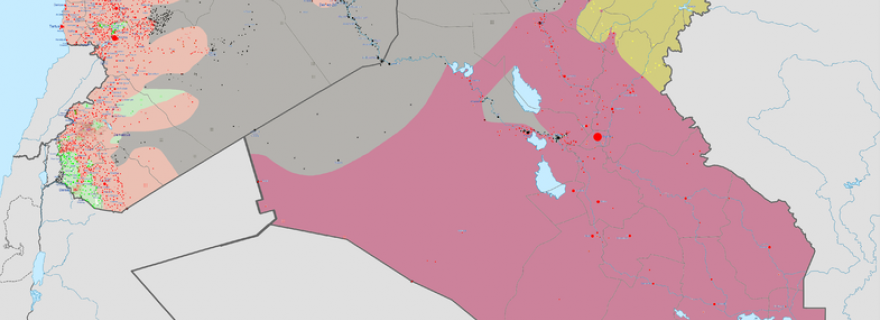Whether ISIS is losing the war
The Islamic State (of Iraq and Syria) seems to be withdrawing, but it is too soon to conclude that it is losing the war.
‘ISIS has lost 9.4 percent of its territory this year’ a recent website article claims. It based its information on Defense analysis group IHS Jane’s 360. ISIS (Islamic State of Iraq and Syria) is believed to control an area of approximately 82,940 square kilometers (a mere 32,000 square miles) in June 2015, following IHS’s definition of territorial dominance. The conclusion of the website article is clear: ‘ISIS is losing the war’. Is it so? Actually, it is hard to tell.
The problem starts with the territory under control of ISIS. How do you know what area is actually part of their self-proclaimed Caliphate and how do you visualize that? This challenge was already addressed in 2014 by Kathy Gilsinan in her article ‘The Many Ways to Map the Islamic “State”’. Referring to different maps from various organizations in the first months of the ISIS-Caliphate, she observed that the estimates of the area under control of ISIS at a given time varied from 12,000 to 35,000 square miles (roughly 31,000 to 90,000 square kilometers). Some maps only indicated the cities and main roads to be under ISIS-control, while other maps counted almost whole provinces as such. But even if the maps indicate differences, the overall trend should be that ISIS is pushed back and thus ‘is losing the war’, isn’t it?
Well, there are other possibilities. ISIS has lost and recovered territory before, like the city of Ramadi in Iraq’s Anbar-province. Or ISIS might execute a strategic withdrawal. In both cases, losing territory is no indicator for ‘losing the war’. In fact, the conclusion one draws depend on the criteria one looks at. Territory under control is just one of such criteria, the number of which might be non-exhaustive, thus complicating analysis. Some analysts focus upon the allies which conduct the fighting against ISIS on the ground: the Iraqi army – according to some – no longer existent, the Kurds now under attack by Turkey. These analysts reach different conclusions than ‘ISIS losing the war’ and emphasize alternative approaches towards ISIS’ Caliphate should be taken into consideration instead of fighting it. They argue that under pressure of a one-year bombing campaign by a multinational coalition ISIS appears to hold out. Even if ISIS has lost 9.4 percent of its territory during 2015, it still holds 90.6 percent. This indicates that ISIS has not lost the war yet.


